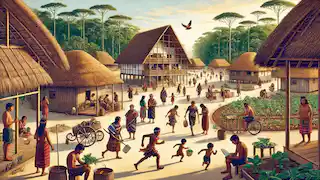The Tale of the Guarani People
Reading Time: 8 min
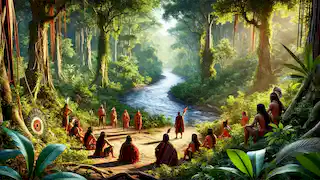
About Story: The Tale of the Guarani People is a Historical Fiction from paraguay set in the Contemporary. This Descriptive tale explores themes of Perseverance and is suitable for All Ages. It offers Cultural insights. The enduring story of the Guarani people’s resilience and connection to nature.
The Guarani people, an indigenous group of South America, have a history rich with stories of resilience, connection to the land, and deep spiritual beliefs. Found primarily in Paraguay, the Guarani have lived for centuries in harmony with the forests, rivers, and the natural world that sustains them. They possess an intimate knowledge of their environment, and their way of life has been shaped by a unique relationship with nature that has persisted through time, despite numerous challenges.
This is the story of the Guarani people, a story that weaves through their ancient traditions, their struggle for survival, and the enduring spirit that continues to define them. It is a tale of strength, cultural pride, and the search for balance in a world that has often been in conflict with their values. As we journey through this narrative, we will explore the wisdom of their elders, the legends of their ancestors, and the way they have adapted to the changing world while holding onto their identity. The Guarani people believe that they were created by a god named Tupa. According to their mythology, Tupa descended from the sky to the earth, shaping the land, rivers, and forests. From the clay of the earth, Tupa formed the first man and woman, imbuing them with life through a sacred breath. These first humans, Yvyraija and Sypave, became the ancestors of all Guarani people, and their lineage spread across the fertile lands of present-day Paraguay and beyond. The Guarani lived in communal villages, where they shared resources, knowledge, and stories. They were a semi-nomadic people, moving between different areas based on the seasons and the availability of food. The forest was their home, providing them with everything they needed to survive—wood for their homes, plants for medicine, and animals for food. The Guarani viewed the world around them not as a resource to be exploited, but as a living entity that must be respected and protected. They believed in the concept of “tekoporã,” a way of living in harmony with nature and with each other. The Guarani’s connection to the land was reflected in their language, which is rich in words related to nature. The rivers, the trees, the sky—all had names that carried deeper meanings. The Guarani language, Guarani Ñe'ẽ, is still spoken today by many people in Paraguay and remains a vital part of their identity. The world of the Guarani changed forever with the arrival of the Spanish conquistadors in the early 16th century. The lush forests that had once been their sanctuary became the backdrop for a new and violent chapter in their history. Spanish explorers, driven by the pursuit of wealth and land, began to move into Guarani territory, bringing with them diseases, weapons, and foreign customs. The Guarani initially attempted to coexist with the newcomers, seeing them as powerful beings sent by their gods. However, as the Spaniards demanded more land and labor, tensions began to rise. The Guarani were forced to defend their way of life against a force that sought to dominate and exploit them. One of the most significant events during this time was the establishment of the Jesuit missions. The Jesuit priests, recognizing the spiritual richness of the Guarani culture, sought to convert them to Christianity while preserving some aspects of their traditional way of life. In the 17th century, the Jesuits established a network of missions, known as "reductions," where Guarani people lived and worked under the guidance of the priests. While the Jesuits aimed to protect the Guarani from the more brutal exploitation of the Spanish settlers, the missions were not without their challenges. The Guarani were encouraged to abandon their spiritual beliefs and adopt Christianity, which created internal conflicts within their communities. Additionally, the missions introduced new ways of living and working that were foreign to the Guarani. Nevertheless, the Jesuit missions became a refuge for many Guarani, offering protection from slave traders and other dangers. At their height, these reductions housed thousands of Guarani people, and the mission towns became centers of agriculture, craftsmanship, and education. The missions also allowed the Guarani to retain a sense of community, as they continued to live together in close-knit villages. The peace and stability offered by the Jesuit missions did not last. In the late 18th century, the Spanish crown began to see the Jesuits as a threat to their power, due to the influence they had gained over indigenous populations. In 1767, King Charles III of Spain ordered the expulsion of the Jesuits from all Spanish territories, including the missions in Paraguay. Without the Jesuits to protect them, the Guarani people were once again vulnerable to exploitation. Many were forced into slavery or pressed into service as laborers on European-owned plantations. The Guarani fought back, launching rebellions against the colonial authorities, but they were outmatched by the superior weaponry and military tactics of the Spanish. One of the most famous of these rebellions was led by a Guarani leader named Sepé Tiaraju. Sepé and his followers fought valiantly to defend their lands from the encroaching settlers, but their efforts were ultimately crushed. Sepé was killed in battle, and the Guarani resistance was broken. The collapse of the Jesuit missions marked the beginning of a long period of hardship for the Guarani people. Their lands were taken, their communities were fragmented, and their traditional way of life was eroded. Yet, even in the face of these challenges, the Guarani held onto their cultural identity, passing down their stories, language, and traditions to future generations. Throughout the 19th and 20th centuries, the Guarani people faced continued challenges as Paraguay underwent a series of political and social transformations. During the War of the Triple Alliance (1864–1870), Paraguay was devastated, and the Guarani population suffered greatly. Many Guarani were displaced from their lands, and the forest that had sustained them was increasingly encroached upon by settlers and industrial interests. The Guarani adapted to these changes in various ways. Some integrated into Paraguayan society, taking on roles as farmers, laborers, or soldiers. Others retreated deeper into the forests, trying to preserve their traditional way of life away from the growing influence of modern society. Despite these pressures, the Guarani remained resilient, finding ways to sustain themselves both physically and culturally. One of the most significant threats to the Guarani way of life has been the destruction of the forest. Deforestation, driven by agriculture and logging, has reduced the Guarani’s traditional lands, making it harder for them to maintain their semi-nomadic lifestyle. The loss of biodiversity has also threatened their ability to gather medicinal plants and hunt for food. In response to these challenges, the Guarani have become increasingly involved in environmental activism, advocating for the protection of their lands and the preservation of the forests. They have worked alongside conservation groups and other indigenous communities to push for stronger environmental protections and to raise awareness about the impact of deforestation on both their culture and the global ecosystem. Today, the Guarani people continue to live in Paraguay and other parts of South America, including Brazil, Argentina, and Bolivia. Their population is estimated to be in the hundreds of thousands, and they remain an important part of Paraguay’s cultural landscape. The Guarani language, once threatened by the forces of colonization, is now one of the official languages of Paraguay, spoken by both indigenous and non-indigenous Paraguayans alike. Despite the many hardships they have endured, the Guarani people have managed to retain much of their cultural heritage. Traditional Guarani music, dance, and art are still practiced, and many Guarani communities continue to celebrate their festivals and rituals. The Guarani’s spiritual beliefs, centered on the idea of living in harmony with nature, continue to resonate in a world increasingly concerned with environmental sustainability. In recent years, the Guarani have also gained greater recognition for their rights. International organizations, such as the United Nations, have called for the protection of indigenous peoples and their lands. In Paraguay, the government has made efforts to support indigenous communities, though many challenges remain, particularly in terms of land rights and access to resources. The Guarani’s story is one of survival, adaptation, and perseverance. They have faced immense challenges over the centuries, yet they continue to fight for their place in the world. As they look to the future, the Guarani remain committed to preserving their culture, protecting their lands, and ensuring that their way of life is passed down to future generations. As the 21st century progresses, the Guarani people are entering a new phase in their history. Many younger Guarani are embracing modern technology and education, while also seeking to preserve their cultural roots. Guarani activists are working to bridge the gap between tradition and modernity, advocating for sustainable development that benefits their communities without sacrificing their environment or way of life. The Guarani have much to teach the world about resilience, community, and the importance of living in harmony with nature. Their wisdom, passed down through generations, offers valuable lessons in a time when the planet faces unprecedented environmental and social challenges. As the Guarani continue their journey, their story remains an inspiration—a testament to the strength of the human spirit and the enduring power of cultural identity.The Origins of the Guarani
The Arrival of the Conquistadors
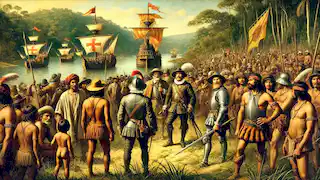
The Fall of the Jesuit Missions
The Struggle for Survival
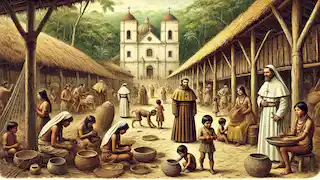
The Modern Guarani
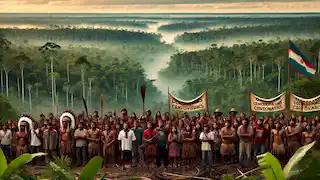
A New Dawn
